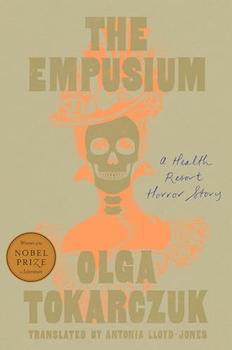Summary | Excerpt | Reviews | Beyond the Book | Read-Alikes | Genres & Themes | Author Bio

A Health Resort Horror Story
by Olga TokarczukThis article relates to The Empusium
_min.jpg) Olga Tokarczuk's novel The Empusium is set in the mountain health resort of Görbersdorf (modern day Sokołowsko in Poland) in 1913. Renowned for its tuberculosis sanitorium, the town fit into a context of around 600 similar resorts in Europe that focused on recovery from then-incurable diseases, as well as overall wellness. The eve of the First World War turned out to be a high-water mark for these spa and health resorts, which had developed over the centuries into luxurious destinations for the continent's elite.
Olga Tokarczuk's novel The Empusium is set in the mountain health resort of Görbersdorf (modern day Sokołowsko in Poland) in 1913. Renowned for its tuberculosis sanitorium, the town fit into a context of around 600 similar resorts in Europe that focused on recovery from then-incurable diseases, as well as overall wellness. The eve of the First World War turned out to be a high-water mark for these spa and health resorts, which had developed over the centuries into luxurious destinations for the continent's elite.
The healing properties of hot springs have been a subject of human interest on a global level since antiquity, but it wasn't until the 1700s that a veritable industry began popping up in Europe's spa towns. Based on the new medical practices of the Enlightenment, spas began to cater to a European aristocracy who were "au fait" with these up-to-date ideas. "Taking the waters," as it became known, was shorthand among this elite for a visit to one of these burgeoning towns: Baden-Baden in Germany, Carlsbad in Austria-Hungary, or Vichy in France, to name a few.
Although initially reserved for the upper classes in the 18th century, spa towns began to open up to the bourgeoisie over the course of the 19th century. Brought by a newly integrated rail network, Europe's growing middle class followed its royalty into the palatial hotels now springing up in health resorts across the continent. Modern mass tourism had begun. In Mariánské Lázně—now in the Czech Republic—King Edward VII could appreciate the peace and quiet, but so too could the likes of Franz Kafka and Mark Twain. The American humorist visited this "Austrian health factory," as he called it, in 1891 when it was "the brightest and newest-looking town on the Continent." Europe's spa towns had by this point transformed themselves into international centers of social life, with an emphasis as much on recreation as on health.
Everything changed, however, with the First World War. If in 1914 you could have spotted a monarch strolling through the colonnades of sleepy Mariánské Lázně, by 1918 many of those same monarchs were either dead or deposed. After four years of fighting, the aristocratic social order on which the spas had been based collapsed. Germany fell into violent revolution; Austria-Hungary splintered into numerous unstable republics competing over the territory of the old empire—territory on which many of the continent's best-loved resorts had been located. The foreign visitor no longer knew the country in which their favorite spot was found, nor if they would be welcomed back.
The social upheaval in the aftermath of the Second World War finished off most of what remained of the industry. Görbersdorf, for example, was ceded to Poland from the German Reich along with much of the rest of Silesia; its name was changed to Sokołowsko and the German population was expelled, replaced by ethnic Poles. Similar forced population transfers occurred in Czechoslovakia, Hungary, and the Soviet Union. Behind the Iron Curtain, spas were nationalized and run by the state as enterprises in service of the public good. But even if the new socialist governments sought to "democratize" access, the world in which these spa towns had grown up was thoroughly gone. Naturally, they suffered as a result, and European culture largely left its health resorts behind. Brehmer's sanitorium in Görbersdorf, on which Tokarczuk bases The Empusium, is a typical case: its ruins can be seen in the town to this day.
Filed under Places, Cultures & Identities
![]() This article relates to The Empusium.
It first ran in the October 2, 2024
issue of BookBrowse Recommends.
This article relates to The Empusium.
It first ran in the October 2, 2024
issue of BookBrowse Recommends.
It is among the commonplaces of education that we often first cut off the living root and then try to replace its ...
Click Here to find out who said this, as well as discovering other famous literary quotes!
Your guide toexceptional books
BookBrowse seeks out and recommends the best in contemporary fiction and nonfiction—books that not only engage and entertain but also deepen our understanding of ourselves and the world around us.